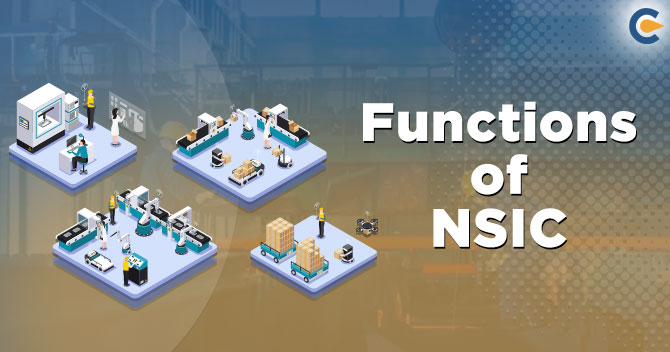The National Small Industries Corporation (NSIC), an ISO 9000 certified company, has been working to fulfill its mission of promoting, aiding, and fostering the growth of the small-scale industries and industry-related small services/businesses the country. There are various functions of NSIC, from which some are discussed further in this article.
Role and Responsibility of NSIC
National Small Industries Corporation (NSIC) was set up in the year 1955 as the central government undertaking. The main aim is to fulfill the machinery and equipment requirements for the development of small entrepreneurs. It has been observed that the primary constraint faced by entrepreneurs is the shortage of investible funds to purchase machinery and equipment. The non-availability of finance deprives many new entrepreneurs of availing entrepreneurial opportunities.
NSIC has been established to cater to this need of the entrepreneur. NSIC provides equipment, plant, and machinery on a hire-purchase basis. Under its scheme, entrepreneurs can procure indigenous as well as imported machinery. But the scheme does not include second-hand machinery and machinery costing less than Rs. 1000. NSIC Registration helps to assists the entrepreneurs in procuring government orders for various items of stores.
Discrimination is made between the units located in industrially developed regions & the units of scheduled castes, scheduled tribes, and persons with disabilities, ex-servicemen, and women. New entrepreneurs are given special incentives. For imported machinery, an entrepreneur must abide by the provisions of the government’s import policy. Entrepreneurs have to secure the license for such imports. In special cases, the entrepreneurs have to prepare prototypes of the machines.
Over a period of time, growth, transition, and development, the NSIC has proved its strength within the country and abroad. It promotes modernization, upgrading technology, quality consciousness, strengthening linkages with large and medium enterprises, and enhancing export projects and products from small-scale enterprises.
Read our article:What are the Schemes for obtaining NSIC Registration?
Functions of NSIC


Organizational Set-Up
The policy guidelines to the NSIC are provided by the Board of Directors consisting of a full-time Chairman-cum-Managing Director, two Functional Directors, two Government Nominee Directors, one SIDBI Nominee Director, and six Non-official part-time Directors. The Corporation is manned by the dedicated team of professionals at different levels. It operates through 123 offices located all over India and one office located in Johannesburg (South Africa).
The National Small Industries Corporation operates through 9 Zonal Offices, 33 Branch Offices, 14 Sub Offices, 10 NSIC Business Development Extension Offices, 5 Technical Services Centres, 3 Extension Centres, and 2 Software Technology Parks supported by the team of over 500 professionals spread across the country. To manage the operations in African countries, NSIC operates from its office in Johannesburg.
Capital Structure & Borrowings
The authorized capital of the organization on 31st March 2013 was 53500 lakhs equity share of 100 each. The subscribed and paid-up capital of a Corporation on the same date was 46299 lakhs shares of 100 each. The loan from financial institutions and banks can provide the loan. Repayment of installments and interest due in respect of all loans were promptly made on the due dates.
Government Grant and Subsidies
The Indian MSMEs is to upgrade their technology, quality and adoption of modern management techniques to keep pace with the global changes Investment is the prerequisite to bring about transformation. The availability of adequate credit at an affordable cost, thus, becomes critical for Indian MSMEs. It needs grants and assistance from the sponsoring organization. The government has extended support in the form of grants and subsidies to this sector through NSIC for promoting MSMEs by taking up Marketing Activities, Commercial Activities, and General Activities.
Considering the growth potentials for MSMEs’ contribution to GDP, its export earning capacity and thereby stabilizing the balance of payment in the international trade, capabilities to promote entrepreneurship and creation of employment, the government support for MSMEs in the form of grants and subsidies through the NSIC increased substantially over the years.
Schemes of the Corporation
To enhance the competitiveness of MSMEs, the NSIC provides integrated support services in the areas of Marketing, Technology, Finance, etc. It implements various schemes that include Marketing Assistance and Performance & Credit Rating on behalf of the registered MSME.
In addition, NSIC has been set up the Training cum Incubation Centre. With large professional manpower, it provides a package of services as per the MSME sector’s needs. It carries forward its mission to assist small enterprises with a set of special schemes designed to put them in a competitive and advantageous position. The schemes comprise facilitating marketing support, credit support, technology support, and other support services. It operates the countrywide network of offices and Technical Centres.
Conclusion
The NSIC occupies a unique position among the Institutions set up to aid Small Scale Industries. NSIC has been working to fulfill its mission of aiding, promoting, and fostering the growth of small scale industries, now commonly known micro, small and medium enterprises – MSMEs in the country. Hence, the functions of NSIC is important for the development of the medium and small scale industries.
Read our article:National Small Industries Corporation (NSIC) Schemes











